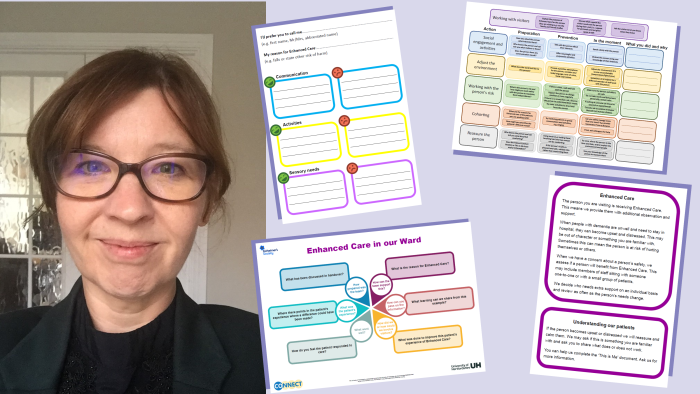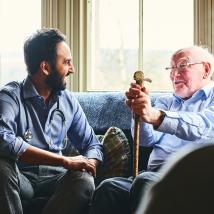Researchers from ARC East of England, hospital staff and people living with dementia have co-designed resources that support hospital teams in using person-centred approaches when caring for people living with dementia during hospital admission.

Person-centred approaches are recognised as best practice when caring for people living with dementia. This approach creates a more supportive and understanding environment for individuals with dementia and enhances their quality of care. However, hospitals do not utilise this approach due to limited resources and a lack of understanding of how to incorporate it. When there are safety concerns regarding an individual, hospitals often implement one-to-one support or close supervision of a small group of patients (constant observation). Constant observation provides an opportunity to embed person-centred approaches.
Funded by Alzheimer's Society, the CONNECT study has launched resources to encourage using person-centred approaches for people living with dementia in hospitals to improve the quality of care. This includes information for family and friends so they can understand how staff are supporting the person living with dementia and invite them to discuss the person’s care needs with staff. In addition, there are tools for hospital staff to understand individual needs, preferences and abilities, share what they learn with colleagues and collaboratively consider proactive ways to support a person. These resources have been co-designed with hospital staff, people living with dementia, family supporters and the research team. Accompanying videos and a resource guide are available to help you better understand how and when to utilise the resources.
“The CONNECT Enhanced Care intervention promotes a team approach to care through resources designed to fit with staffs’ everyday work. Staff who used the resources found they were easy to incorporate into their work, enhanced the experience of care for people with dementia and improved communication with family supporters and across the care team.”
Dr. Melanie Handley, Principal Investigator
Led by Dr. Melanie Handley, Associate Professor at the University of Hertfordshire and ARC East of England researcher, the CONNECT study was conducted in hospitals in three regions across England. It aimed to see whether person-centred approaches for people with dementia could be implemented during constant observation.
Following a three-month trial of the resources, the CONNECT study shared its early findings at an event last year. The event was attended by health and care professionals, Integrated Care System (ICS) representatives, people with lived experience and academics in dementia care research to understand the challenges of implementing person-centred care. It was found that it is important to consider how dementia care is prioritised and valued by those in leadership roles in hospitals.
“Being in hospital can be a stressful and confusing time for people living with dementia and their loved ones. This is why we are proud to have funded the CONNECT study. This ground-breaking study isn't just about monitoring – it's about preventing accidents and complications for people with dementia in hospitals.
Dr Richard Oakley, Associate Director of Research and Innovation at Alzheimer’s Society
Dr Richard Oakley continues, “Based on their findings, the researchers have created a vital set of resources to enable hospital staff to understand each patient's individual needs and preferences, so they can tailor care, keeping the patients safe and comfortable. As with much of the research we fund at Alzheimer’s Society, this work engaged people living with dementia to best understand what they would need from the resources to maximise their effectiveness.”
The CONNECT study is currently finalising its findings. The project and the resources have already gained interest from other NHS trusts and health organisations to embed person-centred approaches as part of routine care.
